The plant Gilgamesh found was not a lotus
(emphasis mine)
So Utanapishtim revealed to Gilgamesh another secret of the gods. Under the sea there is a wondrous plant, like a flower with thorns, that will return a man to his youth. Gilgamesh then opened the conduit, tied stones to his feet, plunged into the deep (Apsu), and retrieved the plant.
source: http://www.theosociety.org/pasadena/sunrise/49-99-0/mi-wtst.htm
Lotus doesn't grow underwater. Neither does it have thorns. Also, lotus growing in a sea is highly unlikely because it doesn't favor the conditions needed for the lotus to exist.
This is confirmed in another translation of the same text (emphasis mine).
Then Utnapishtim spoke unto Gilgamesh (and said): “Gilgamesh, thou didst come here weary; thou didst labour and row. What now shall I give thee, that thou mayest return to thy country? I will reveal unto thee, Gilgamesh, a mystery of the gods I will announce unto thee. There is a plant resembling buckthorn; its thorn stings like that of a bramble. When thy hands can reach that plant, then thy hands will hold that which gives life everlasting.”
source: http://www.jasoncolavito.com/epic-of-gilgamesh.html
So the plant Gilgamesh found was most probably a species of Rhamnus.
A myth related to the plant that Gilgamesh found is related to the snakes (emphasis mine):
At twenty double-leagues they then took a meal: and at thirty double-leagues they took a rest. And Gilgamesh saw a well wherein was cool water; he stepped into it and bathed in the water. A serpent smelled the sweetness of the plant and darted out; he took the plant away, and as he turned back to the well, he sloughed his skin.
source:http://www.jasoncolavito.com/epic-of-gilgamesh.html
This myth serves as an explanation to the skin shedding of the snakes. By implying (indirectly) that the snakes achieved eternal youth
